Orchids are among the most popular flowering houseplants. While their exquisite beauty and stunning blooms make them a desired addition to any home, some may be concerned about their pets or small children coming in contact with orchids. Are orchids poisonous to dogs, cats, and humans?
The good news is that the majority of orchid species are not poisonous to animals and humans. While ingesting parts of an orchid can cause stomach upset and discomfort, most will not be fatal. The exception is the genus Phalaenopsis, which contains a few species that are toxic if ingested in large quantities.
Therefore, it is generally safe to keep orchids in the home, even if you have pets or small children. However, it is still important to take certain precautions such as keeping the plants out of reach of animals and young children. Additionally, be sure to keep any chemicals used for fertilizing and treating your orchids away from both humans and animals.

Toxic Household Plants and Side Effects
Household plants, including orchids, can have toxic effects for dogs when ingested. If a dog has eaten any part of an orchid plant, it is important to monitor them for signs of discomfort and seek veterinary help if necessary. Although orchids are not poisonous to pets, there are certain parts that can cause harm such as pesticide residue, fertilizers, and dye on the plant.
Pesticides can cause gastrointestinal upset and mild poisoning in dogs when ingested, so it is important to check the label before you bring any plants into your home. Fertilizers can also have an adverse effect as they contain high levels of phosphorus and nitrogen, which can damage a dog’s.
TOXIC ORCHID MYTH
The TOXIC ORCHID MYTH is a popular misconception about the danger of orchids to pets. The truth is that many varieties of orchid are not toxic to cats and dogs, so long as the animals do not ingest them. In fact, most commercially available orchids are non-toxic and pose little risk:
- MAJOR TOXICITY – Many of the houseplants we keep in our homes and gardens are surprisingly toxic. If ingested, they can cause serious illness or even death in pets and humans alike. Unfortunately, some of these plants include popular foliage plants like pothos, philodendron, and English ivy. All parts of these plants contain major toxins that can lead to severe consequences if consumed. As such, it is always best to use caution when handling and keeping these plants in your home or garden, as even small amounts of them can be dangerous. If you suspect that your pet has ingested any part of a toxic houseplant, seek veterinary help immediately. Fortunately, no orchids are on this list of dangerous plants, so you can keep them with peace of mind.
- MINOR TOXICITY – Many common household plants contain minor toxins which, if ingested or inhaled, can cause serious side effects such as vomiting and severe diarrhea in pets. These symptoms occur because the animal’s body senses the poison and attempts to expel it quickly as a protective mechanism. Plants such as redwood bark are particularly dangerous, as their toxins are more easily absorbed. In the event that your pet ingests a minor toxic houseplant, make sure to call your vet immediately and seek advice. Prompt medical attention can greatly reduce the chances of long-term health issues arising from exposure to these toxins. It is also important to be aware of plants that may be toxic, so as to avoid any potential incidents.
- OXALATES – Oxalates are organic compounds found naturally in many fruits and vegetables, including spinach, rhubarb, beets, and potatoes. They can also be found in some nuts, seeds, and grains. Ingesting foods that contain oxalates can cause an allergic reaction in people and pets alike. Symptoms can range from mild irritation of the nose, skin, eyes, throat or other mucus membranes to a more severe reaction with difficulty breathing and the possible closure of your pet’s throat. If you suspect an oxalate-related allergic reaction in your pet, seek veterinary attention immediately. If none is available, contact poison control for advice on how to proceed.
- DERMATITIS – Dermatitis, also known as skin inflammation, is a common reaction to contact with toxic plants and their juice, sap, or thorns. It can cause an array of responses in the skin such as itching, redness, swelling, blisters, dryness and cracking. In some cases even hives may appear. One orchid on the list, Dendrobium, has been known to cause dermatitis and should be avoided. In cases of contact with Dendrobium or any other toxic plant, it is recommended that you wash off any sap immediately and apply a cold compress if needed. If an allergic reaction in the form of a rash develops, it is important to identify the source of the rash, if possible. DERMATITIS or an itchy skin reaction can be treated with topical medications and antihistamines. If blisters do occur from contact with a toxic plant, make sure to keep them clean and dry. In some cases, it may be necessary to seek medical attention.
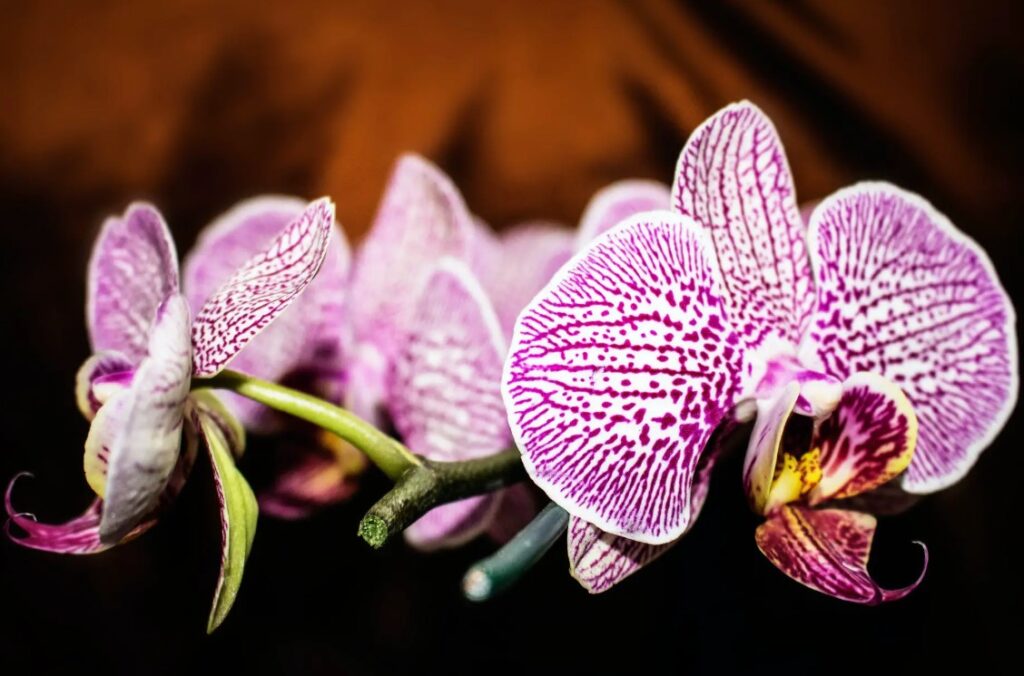
BLUE ORCHIDS POSE A POTENTIAL THREAT TO DOGS
Blue orchids may be aesthetically pleasing, but they pose a potential threat to dogs if ingested. The dye used to tint the flowers is toxic and can cause severe symptoms in canines, ranging from vomiting and diarrhea to seizures and even death.
If you own a pet dog, it is important to ensure that any blue orchids you have in your home are kept out of reach and away from them.
If you suspect that your pet has ingested any part of a blue orchid, seek veterinary help immediately to minimize the risk of serious illness or death. In addition, never put soil from a potted blue orchids near dogs as they could still ingest some of the dye.
ORCHID FERTILIZERS & PESTICIDES CAN HARM DOGS
This content is about the potential harm that orchid owners may be facing from their pet dogs. The harm may come from the fertilizers and pesticides used in the orchid potting mix. Many authors forget to mention this, when discussing cohabitation between animals and orchids.
While it is safe for dogs and orchids to cohabitate, orchids may be exposed to harmful fertilizers and pesticides that can damage the dog’s health.
It is important for pet owners to research the materials used in their orchid potting mix. Many types of fertilizers and pesticdes used in orchids can be dangerous if ingested by pets.

Make sure to keep all potting material away from dogs and other animals. If you already have a pet, be sure to switch to an organic potting mixes which does not contain any synthetic fertilizers or pesticides that could harm your animal companion.
It is also important for potential orchid owners to do their research and find out what types of materials.
OTHER Toxic Household Plants That Harm Dogs
When it comes to keeping household plants, it is essential that pet owners are aware of the potential risks posed by certain plants. While orchids can be a safe choice for those wishing to add greenery to their home, there are many other household plants that can be harmful or even lethal if ingested by pets.
These toxic plants can easily be found in garden centers, making them a potential hazard to curious pets. Here are some of the most common poisonous plants that pet owners should stay away from:
* Aloe Vera – This popular plant contains compounds called anthraquinones which can cause vomiting and diarrhea if ingested by pets.
* Lilies – Lilies can be especially toxic to cats and can cause severe kidney damage.
* Dieffenbachia – This plant contains an irritating sap that causes skin irritation, burning, and swelling if it comes in contact with the mucous membranes of a pet.
* Oleander – All parts of this plant are highly toxic.
However, a few varieties known as “Lady Slipper Orchid” may cause soreness on the muzzle, mouth, or gums when eaten. It’s a fascinating hobby for many plant lovers to cultivate orchids.
These fungi can harm the lungs of you or your pets when potting plants.
Are Orchids Poisonous To Cats? Can Eating Orchids Kill Cats?
Many pet owners may be worried if their cats eat part of their orchid plants, as they may fear that it could be poisonous. Generally speaking, however, the popular indoor orchids are not dangerous for cats and will not kill them.
Cats are curious and playful creatures who often explore things with their mouths, so it is possible that they may nibble on or play with your orchid. If this happens, it could lead to stomach irritation and vomiting for the cat, but this should be temporary and not life-threatening.
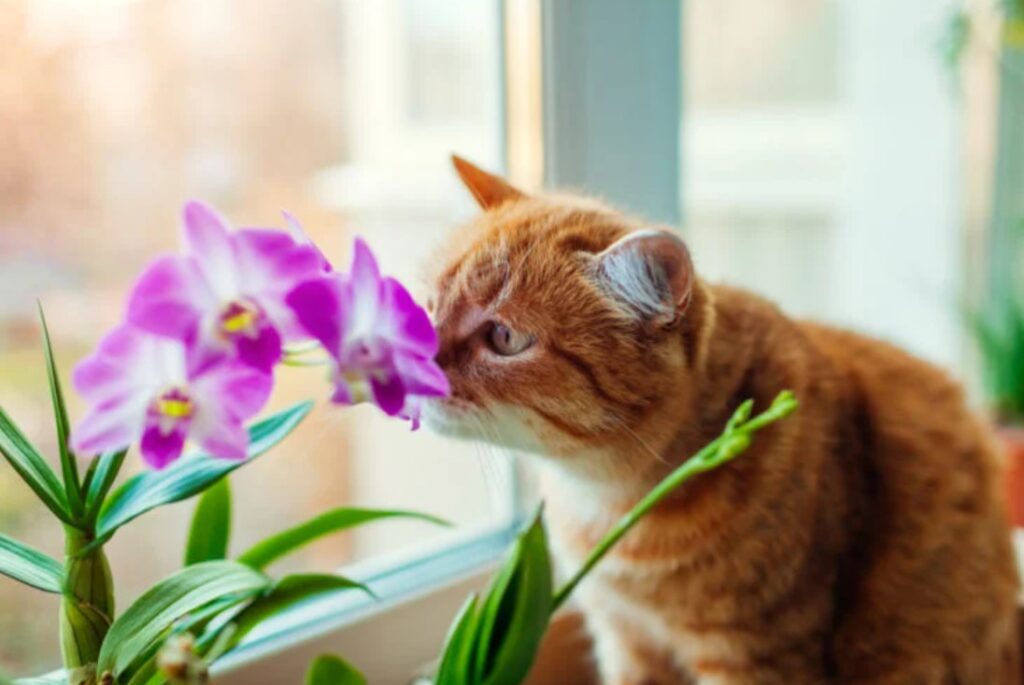
Therefore, if you have both cats and orchids in your home, don’t panic! While it’s best to keep your orchids away from your cats, they should not be in any real danger if they do happen to eat a part of it.
To ensure that nothing more serious happens, keep an eye on your cat and keep them away from the orchid plants when possible. If you are still worried about potential toxicity, consider consulting with your veterinarian.
Are Orchids Pet-Friendly?
The answer to the question “Are Orchids Pet-Friendly?” is yes, with some caveats. Generally speaking, many household orchids can co-exist in the same space as pets. However, it’s always best to keep your orchids out of reach and away from pets.
Even though most orchids are not poisonous to cats or dogs, there is still the potential for choking on orchid parts, or for pets to accidentally break off stems or leaves. And while most household orchids are pet-friendly, there is one popular type of orchid that has a mild toxic rating according to research by the University of California.
Therefore, it’s important to do your research and be aware of the type of orchid you have before bringing a pet into the home. With a little bit of care, it is possible to enjoy both pets and orchids in your household.
What Happens if Your Pet or Child Eats Part of Your Orchid?
It is important to take swift action if your pet or child ingests part of your orchid. Depending on the type of orchid and the size and weight of your pet or child, the effects can range from mild stomach upset to more serious issues.
In general, any ingested parts of an orchid (including leaves, flowers, and roots) may cause nausea, vomiting, diarrhea, or abdominal pain. If these symptoms occur and persist for more than a few hours, contact your veterinarian or seek medical attention right away.
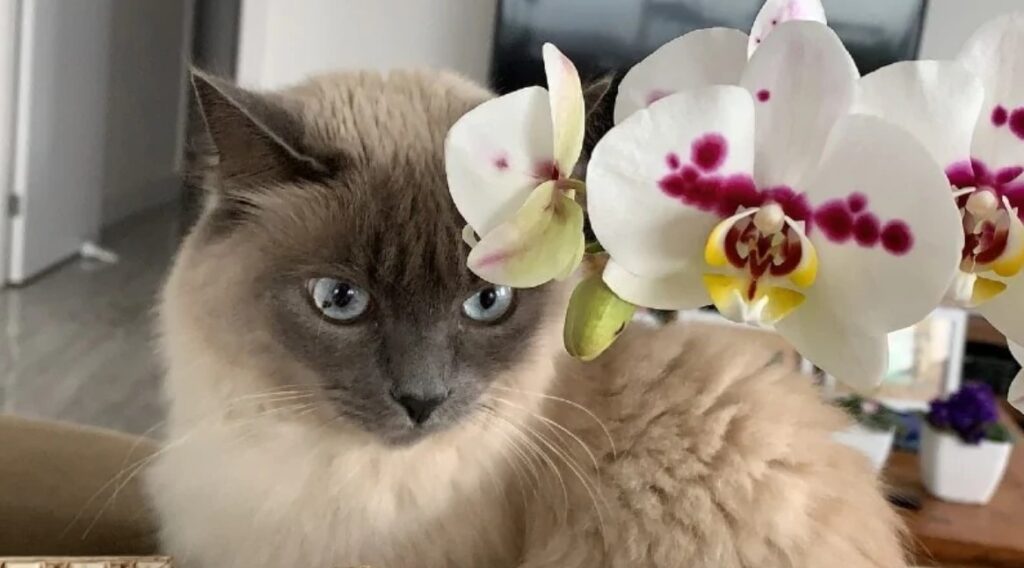
If the orchid ingested is especially toxic, it is even more important to take action immediately as certain types of orchids can be toxic if eaten. In some cases, symptoms can include dizziness, seizures, and difficulty breathing. If you suspect that your pet or child has ingested a toxic orchid, contact Poison Control for assistance right away.
It is also important to monitor your pet or child for any changes in behavior following ingestion of an orchid.
Do Pets Need To Go to the Vet After Eating an Orchid?
It is important to take your pets to the vet if they have eaten parts of your orchid plants, as these can be potentially dangerous. Symptoms such as vomiting, eating less than usual, being lethargic and any other concerning behavior should be taken seriously and you should bring them to their veterinarian for a checkup. Additionally, if your young child has accidentally eaten part of your orchid plant, it is best to call their pediatrician for advice.
If your pet or child experiences mild dermal reactions due to contact with a Lady Slipper, you should also consult with the appropriate medical professional. Taking these precautionary measures can help ensure your pets and children remain safe. Do not hesitate to take your pet or child to the vet if you are concerned about their health after coming into contact with an orchid.
How To Keep Your Pets and Children From Eating Orchids
Orchids are a beautiful, delicate plant that require special care. While they may not be poisonous to dogs, cats or children, it is still important to keep them away from pets and young ones who might accidentally eat the plant. To ensure their safety, there are a few simple steps you can take.
One way to keep your pets and children from eating your orchids is to keep the plants out of their reach. Place your orchid in a spot that is too high for them to access, such as on top of a console, shelf, or table center. This way you can be sure that both your pet and child are not able to access it.

Another way to protect your orchid is by teaching your pets and children the importance of not touching them. Explain why it is important for them to avoid harming the plant, and make sure that they understand that if they do touch it, it could cause damage to the delicate flower.
Finally, you can also take precautions in how you tend to your orchids. When watering and caring for the plants, keep them out of reach of small hands and inquisitive noses. This way, you can ensure that your plants stay safe and beautiful without worrying about any accidents.
Cayenne Pepper as a Deterrent
Cayenne pepper has been used as a deterrent to keep cats away from orchids. Cayenne pepper is a spicy capsicum that produces a hot, burning sensation when ingested. This makes it an effective way to discourage cats from eating the leaves and petals of your prized plants.
Cayenne pepper needs to be applied in very small quantities, as too much can be harmful to cats if ingested. Cayenne pepper should also be applied in a way that minimises contact with the eyes and nose of your cats, as it could irritate their senses and cause further discomfort.
Additionally, Cayenne pepper is not a permanent solution, so you will need to reapply it regularly to ensure it is working. Cayenne pepper is an option to consider if you want to keep cats away from your orchids, but it should be used with caution.
What happens if a dog eats an orchid leaf?
Orchids are beautiful plants that add an elegant touch to any home, but it’s important to be aware of their safety around pets. If your pet has taken a bite out of a Phalaenopsis orchid leaf, don’t worry – the American Society for the Prevention of Cruelty to Animals (ASPCA) states that these plants are non-toxic and edible.
Although eating an orchid leaf is not likely to cause any harm, it’s best to keep your pet away from the plant just in case. If you notice any vomiting, diarrhea or other signs of discomfort after your pet has eaten an orchid leaf, contact your veterinarian right away. It’s also a good idea to consider a more pet-friendly alternative in order to avoid any potential issues.
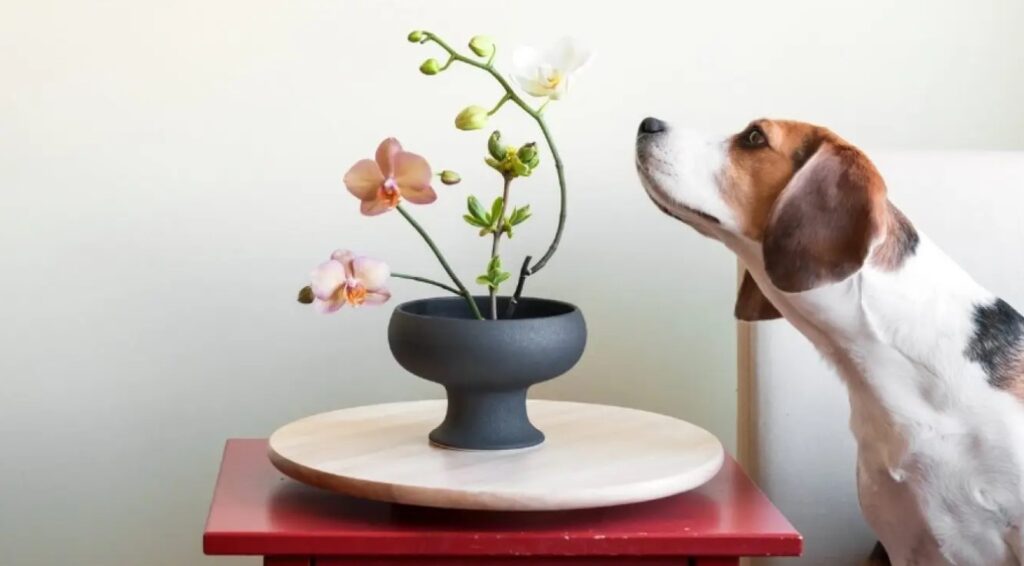
With proper care, you can keep both your Phalaenopsis orchid and your pet safe and healthy. Make sure to research the plant before bringing it into your home, and keep an eye out for any signs of distress that could.
Are orchid leaves poisonous?
Orchids are some of the most beautiful and diverse plants in the world, but many people wonder if they are safe to be around. Are orchid leaves poisonous? The answer is no; orchid leaves are not poisonous and can even be used as a safe and tasty addition to salads and desserts.
All parts of the orchid plant are non-toxic, so feel free to enjoy them. Orchids grown indoors or outdoors pose no risk to pets like cats and dogs either. So, if you have a pet in your house and are considering getting an orchid, rest assured that it won’t be poisonous to your furry friend.
Are Phalaenopsis orchids poisonous to dogs?
Phalaenopsis orchids are a great choice for pet owners who want to spruce up their home with some greenery. These beautiful yet low-maintenance plants are a favorite among those who don’t have the time to dedicate to caring for more demanding varieties.
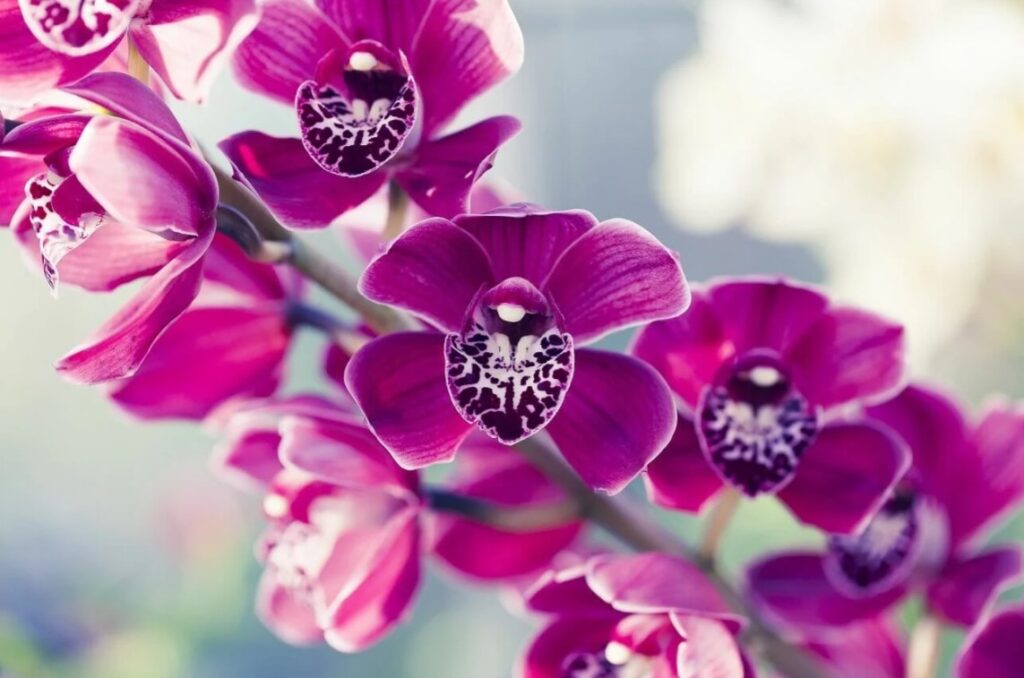
Plus, these flowers are non-toxic to cats and dogs, making them safe to keep in any room of the house. Are Phalaenopsis orchids poisonous to dogs? The answer is no; they are not poisonous and can be enjoyed by all members of the family, including our furry friends! With minimal water requirements and plenty of light, these plants are easy to care for. Read also…
Read also:
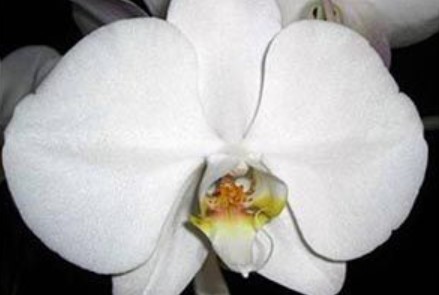
What happens if a dog eats an orchid?
The ingestion of an orchid by a dog is generally not life-threatening, but it may cause some gastrointestinal upset such as vomiting, diarrhea, and abdominal pain. Some orchids may also be toxic to dogs, and the severity of the symptoms can vary depending on the type of orchid and the amount ingested. If a dog eats an orchid, it’s recommended to monitor them closely for any signs of discomfort and contact a veterinarian if necessary.
Are orchid leaves poisonous?
Most orchid leaves are not poisonous to humans or pets, and handling them should not cause any harm. However, some orchids may produce toxins or irritants that can cause skin irritation or allergic reactions in some people.
Are Phalaenopsis orchids toxic to dogs?
Yes, Orchid Cactus (Epiphyllum spp.) can be toxic to dogs if ingested. The plant contains insoluble calcium oxalate crystals that can cause irritation, vomiting, and difficulty swallowing if consumed by dogs.
What to do if your dog is poisoned by a plant?
If you suspect that your dog has been poisoned by a plant, you should immediately contact your veterinarian or an animal poison control center. They will be able to advise you on what steps to take next, which may include inducing vomiting, administering activated charcoal, or providing other treatment. It is important to act quickly, as some plant toxins can be life-threatening if not treated promptly.
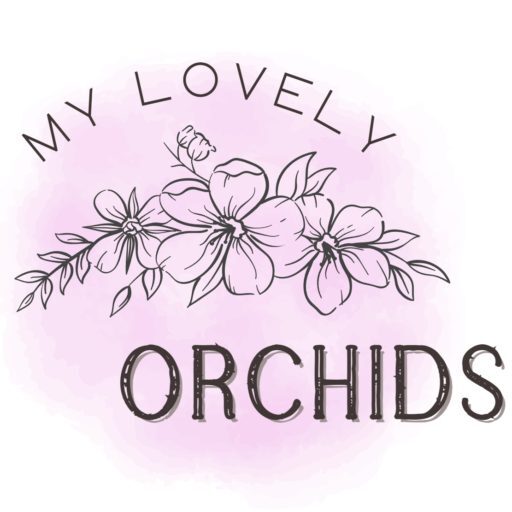
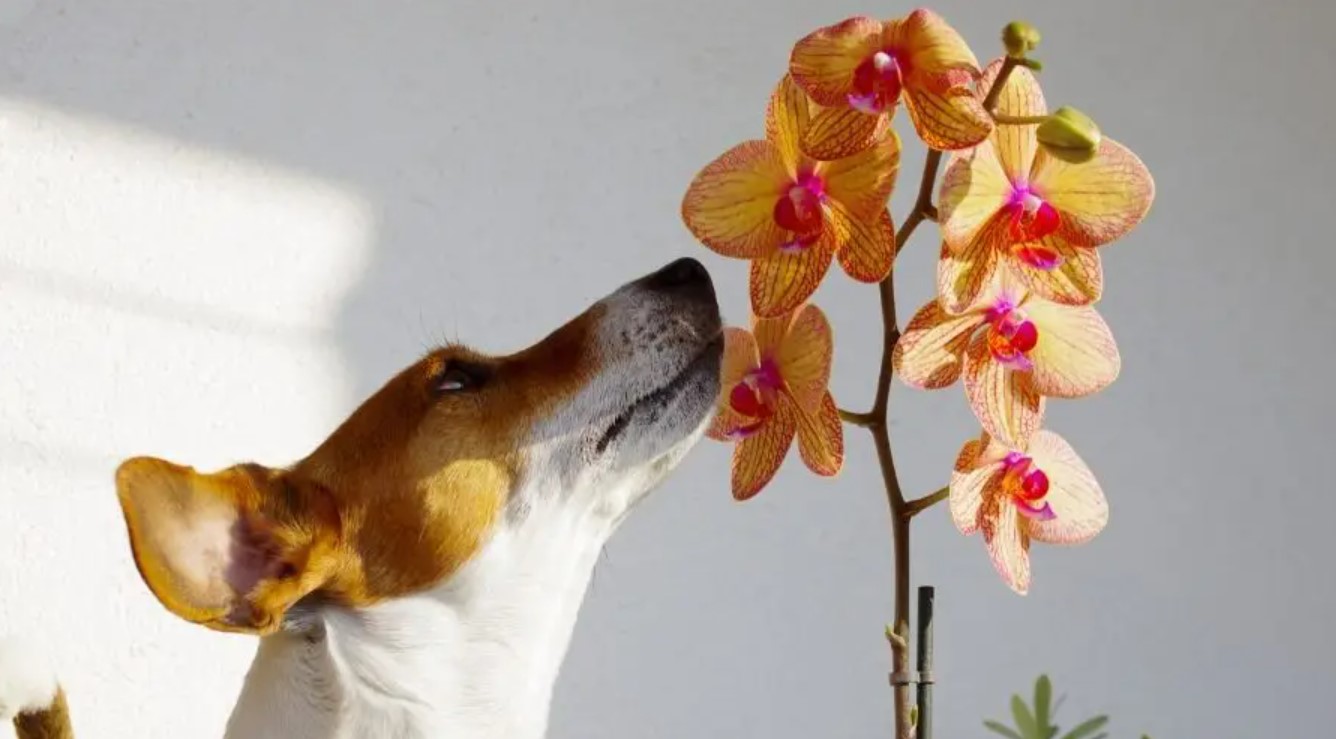
Have this problem with my cat. My cat eats it at night=(
Thanks for taking the time to post about Pets & Orchids. I didn’t realize the Blue orchids are dyed and that could be a problem if the dog ate some of the orchids. And I didn’t realize that Paphs could cause an allergic reaction. Why would they, in particular, compared to the other Orchids??